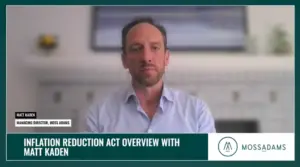Nuclear Energy Will Need to Play a “Considerable Role” In Decarbonization to Make Up For Wind & Solar’s Deficiencies
As our world becomes more digitally interconnected, the demand for electricity continues to surge, fueled by sectors as diverse as electric vehicles, data centers, and artificial intelligence. The increasing need for a reliable and renewable energy source is a pressing matter, and nuclear energy is stepping up as a formidable contender, despite its historical controversies. States like Colorado are seeing the signs and putting their money where their mouth is to gauge nuclear’s role in a decarbonized energy industry.
Amid the worldwide nuclear energy revival is underway, with 413 reactors across 32 countries generating roughly 10% of global electricity and the U.S. leading with 92 active reactors, Colorado is contemplating its nuclear future with a study named “Assess Advanced Energy Solutions In Rural Colorado.” It currently awaits the Governor’s approval to direct the Colorado Energy Office to investigate energy alternatives such as nuclear, carbon-captured natural gas, geothermal, clean hydrogen, and renewables.
While nuclear is being weighed against other renewables, experts say achieving carbon-free power generation without nuclear seems unlikely due to the limitations of wind and solar. The more popular iterations of renewables lack “inertia” provided by spinning turbines necessary for electrical grid stability, meaning they need extensive backup power, up to 80-90% of their capacity, for times of insufficiency.
Michael Davies, founder and data analyst at Green Econometrics, assesses the current perception of nuclear energy and its place among wind and solar renewables. He’s of the same mind as nuclear proponents: It’s unlikely we’ll meet any of our decarbonization goals without nuclear playing a “considerable role.”
Michael’s Thoughts
“We’ve made some advances in nuclear generation, and I think it plays a considerable role. For one, it’s one of what we consider a renewable energy. When we look at solar and wind, they’re intermittent by nature and require energy storage to make them reliable and stable. When we look at nuclear, it is a mixed question for most people because of its negative connotations.
But the bottom line is, we’ve got increased requirements for energy. Capacity is constrained with demand for electric vehicles. We’ve got the growth in data centers and most recently with the growth in artificial intelligence calling for more power to power the chips that generate AI capabilities, more electricity is going to be required.
When we look at nuclear, it is considered one of the renewable energy forces out there. And look, it’s important right now. For one, with increased demand for energy, we need more renewables. We need energy storage to help provide the resiliency and stability of the grid. And when we look at the economics out there, what’s required is that we have inflation in mind with OPEC, you know, calling for production cuts, it’s only going to drive oil prices higher, and therefore to mitigate inflation. We need alternatives.
Solar and wind are great, but they’re not going to be 100%. Given that they’re intermittent by nature and the fact that energy storage has got to be coupled with that. So bottom line, we may not like it and given the fact that the state of Colorado is moving forward what they call this renaissance in nuclear, I think it needs to be given consideration. We’re not a real proponent, but the bottom line is is that we need more sources of energy and reliance on coal and oil are not going to get us there.”
Article written by Daniel Litwin.






